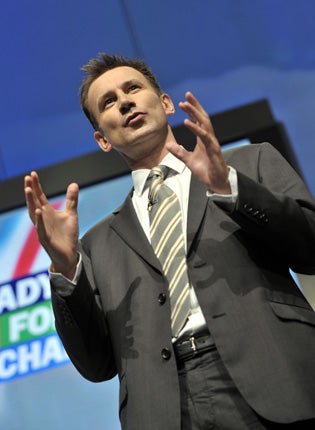Tories threaten to tear up Lord Reith's BBC legacy
Conservative government would abandon royal charter

Already reeling from accusations of bias and threats of cuts from Ben Bradshaw, the Secretary of State for Culture, Media and Sport, the BBC was yesterday slapped down again by his Conservative counterpart, Jeremy Hunt, who pledged to scrap its governing body and said he was even considering ripping up the Corporation's historic charter.
In an interview with the Financial Times, Mr Hunt said that the BBC Trust, which was set up after the Hutton inquiry to regulate the BBC, had "failed". He also accused the Corporation of being "out of touch" with the licence-fee payers in comments that suggested the BBC would be in for a painful future if the Conservatives came to power at the next election.
"[We will have] a very fundamental root-and-branch discussion with the BBC about all its activities across the piece," said Mr Hunt, who warned BBC executives that the corporation's online activities were too ambitious and were damaging the rest of the British media. The BBC is planning so-called passion websites. It might sound well and good for them to have, say, an angling website, but if it drove out of business every angling magazine in the country, you would have to question if it was the right sort of thing to do."
The BBC might draw some comfort from Mr Hunt's comment that he was opposed to plans set out in the government-commissioned report Digital Britain that the corporation should share £130m in television licence fees with other broadcasters.
He was adamant that the BBC Trust, which was set up in 2005 and forms part of the royal charter of the BBC must be replaced with another system of governance. The charter runs for 10 years up to 2015. "We haven't made a decision on the timing of [changes in the governance structure], but we do think the structure...has failed," he said. "We are looking into whether it would be appropriate to rip up the charter in the middle of it, or whether one should wait."
The idea of "ripping up" the BBC's royal charter is highly provocative. The charter, which was first granted in 1927 when it was led by Lord Reith, decreed that the corporation's views should be independent of government influence.
The future of the BBC has become an election issue and the corporation now finds itself as a political punch-bag, with each of the major parties seeking to outdo the other in softening it up.
The Liberal Democrats' media spokesman, Don Foster, said last night that the language of the debate on the BBC's future had become so extreme that it was now "characterised by a threat to the independence of the BBC".
He added: "What's happening at the moment from both the Tories and Labour is an attack on the independence of the BBC, and that's something we should be worried about. Even if on occasions their criticisms are legitimate, if you start saying, 'We will cut you down to size or rip up your charter,' you have a recipe for the loss of independence."
Mr Foster did, however, echo Mr Hunt's opinion that the BBC Trust was a flawed structure, acting simultaneously as both regulator and cheerleader of the BBC.
The Trust yesterday tried to play down Mr Hunt's threat to its future. "The BBC Trust is getting on with the job set out for it in the charter of protecting the interests of licence fee payers, defending the independence of the BBC, and reshaping the BBC to meet the challenges ahead," said a spokesman.
"The point of having a charter that runs for 10 years is to give the BBC stability and keep it at arm's length from the political process. This charter was drawn up after lengthy, detailed and intense debate about the BBC's mission. It still has seven years to run. It establishes the Trust as the way of protecting the independence of the BBC. Let's respect that."
The BBC and the Tories: A history of bad blood
*October 1979
BBC filmed gunmen holding up traffic in Carrickmore protesting at increased activity by British security forces. No footage was shown, but Margaret Thatcher was said to go "scatty" when she heard about the filming. New clearance procedures were put in place.
*March 1985
Thatcher set up a committee to look into BBC funding chaired by Sir Alan Peacock in anticipation that it would recommend scrapping the licence fee.
*April 1986
Peacock dashed Thatcher's hopes by saying the licence fee should stay, but proposed selling BBC Radio 1 and 2.
*April 1986
Norman Tebbit, the Tory chairman, issued a dossier alleging BBC anti-Tory bias after the US bombing of Libya. He described coverage as "riddled with inaccuracy, innuendo and imbalance".
*April 1995
A BBC Panorama interview with John Major was not shown in Scotland after a ruling it would influence local elections.
*March 2009
David Cameron called for the BBC licence fee to be frozen for one year to "set an example" in reducing costs in the public sector during the recession.
*June 2009
Jeremy Hunt, the shadow Culture Secretary, called on the BBC to "actively" recruit more Conservatives to its news staff to improve balance.
Join our commenting forum
Join thought-provoking conversations, follow other Independent readers and see their replies
Comments